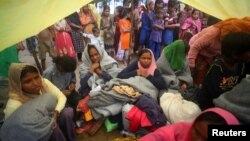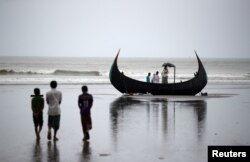The U.N. refugee agency reports at least four Rohingya refugees fleeing violence in Myanmar died Tuesday morning when their boat capsized in the Bay of Bengal close to the southern shore of neighboring Bangladesh.
UNHCR spokesman Babar Baloch said 42 members of six families, including men, women and children, were aboard the doomed vessel when it ran into rough seas while approaching the shore. U.N. refugee aid workers and partners on the ground reportedly rushed to the scene to provide medical aid, food, blankets and clothes to survivors.
“The boat was hit by large waves and eventually capsized, trapping people underneath. Several were injured when they hit the engine. A 15-year-old boy died on the spot. In all, 22 injured were rushed to hospitals and NGO (non-governmental organization) clinics, but three reportedly died en route,” he said.
Baloch said the remaining 19 were taken to UNHCR's transit center near Kutupalong camp.
In a separate incident, authorities in Bangladesh said three infants drowned after slipping from their mothers' laps when a boat bringing them from Myanmar reached shore.
The International Organization for Migration reports more than 607,000 Rohingya have arrived in Cox’s Bazar, Bangladesh, since the mass exodus of refugees from Myanmar began August 25. IOM spokesman Joel Millman said new arrivals appear to be slowing, although people continue to arrive daily in the area’s makeshift settlements.
“The settlements are dangerously congested and overcrowded, and the pressure on sources of clean drinking water and basic sanitation are enormous. Having walked for days without water and food, the refugees arrive to the settlements exhausted and thirsty. Many are ill,” he said.
Millman said all the spontaneous and makeshift sites where the refugees are camped out urgently need water, sanitation and hygiene to prevent diseases from breaking out.





